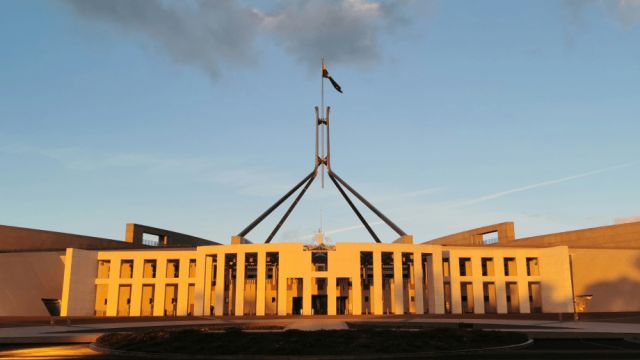Opinion: Sussan Ley can be a circuit-breaker ... if the Libs allow her to be

By Mark Kenny
A version of this article was originally published by The Canberra Times.
Long the overlooked understudy, Sussan Ley remains cautiously Delphic about her plans to rebuild the Liberal Party. But don't let that fool you.
For years, she's been watching and learning from the "big beasts" of conservative certainty: Tony Abbott, Malcolm Turnbull, Scott Morrison and Peter Dutton - men "destined to rule".
These chaps are now all gone from politics - each, in the end, having made more opponents than supporters.
Categorically, Ley is not "of" this phenotype. Which is why her plans to resuscitate the flatlining party begin with what not to say when communicating internally with MPs and externally with voters.
Self-evidently, Ley can be a circuit-breaker ... if they allow her to be. Already, her vanquished rival, Angus Taylor is publicly opposing the suggestion of rule changes to select women for winnable seats. He calls affirmative action "undemocratic" knowing full well how that cruels her pitch.
Some people might make the same observation about Liberal factions. Or the enforcement of shadow cabinet solidarity. Some might even say that opposing quotas is a strange mound to die on for "liberals" after ascending the mountainous debt of government-funded-and-operated nuclear power.
In any event, it is hard to recall an instance when Dutton was so publicly countermanded.
Despite a margin of just four votes over Taylor in last month's leadership ballot, what Ley envisions simply must be bold - closer to a rebuild than a renovation - albeit, while keeping the heritage-listed facade - let's call it "mid-century Menzies"?
For all that, Ley knows she must hasten slowly. Reading between the lines, she wants to get back to basics, steer back to the mainstream. This would involve concentrating political contest around the traditional differences with Labor over managerial competence, budget and economic discipline, defence and national security, business deregulation and aspiration.
Her "sealed section" might also include an end to the climate wars and the formal adoption of quotas to get women in Parliament - about which she is "agnostic".
She describes all this as "meeting Australians where they are", which sounds as harmless as it does overdue.
But for a punchy party addicted to the sugar-hit gratifications of culture wars, it is a correction likely to adduce plenty of Trumpian malcontents.
On the plus side, Ley has a bona fide crisis to fix.
The Coalition she has inherited needs a 75 per cent increase in seats to reach a majority in 2028. And virtually all of those gains must come in the cities, where the anti-woke, anti-renewables and anti-metro vibes from Dutton and the Nationals have basically killed the brand.
"We didn't just lose, we got smashed, totally smashed," Ley told the National Press Club on Wednesday.
"Over two elections, the Coalition has lost 33 seats in the House of Representatives. We've lost eight seats in the Senate.
"Our primary vote has fallen by more than 9 per cent in the House. Our two-party-preferred vote is down more than 6 per cent, and we now hold just two of 43 inner-metro seats and seven of 45 outer-metro seats."
Take that! Simply by acknowledging the scale of her party's descent, Ley showed more grit and empiricism than Dutton ever did.
The "hardman" drafted unopposed after Morrison surrendered six Liberal jewels to female community candidates in 2022, had preferred to revile rather than resolve the "gender-quake" that had just levelled his party's blue-ribbon heartlands.
Morrison had scoffed at the "cafes, dinner parties and wine bars of the inner-cities," but instead of disowning such bone-headed insults, Dutton doubled down, never hiding his contempt for the teals and for their voters. It was a declaration of war, with women generally and with the affluent Australians on whom the Liberal Party was built. Yet nobody in the party room (Ley included) spoke up at the time.
In her first month as leader, however, Ley has already done more soul-searching and more listening than her predecessors undertook in eight years.
In the aftermath of a thrashing, she prefers John Howard's folksy wisdom that the Australian voters got it right. Thus, she says openly that a Liberal majority requires some or all of the teal seats.
That Ley's was the first Press Club address by a Liberal leader in three years simply underscored what an odd, divisive unit Dutton had been.
That it was the first address to the club by a female opposition leader (from either side) also made it historic.
Of course, this was also smart internal politics. It cemented on the record that the 2025 rout belonged as much to the abrasive rhetoric and policies Dutton espoused as to his poor standing.
Ley needs her MPs to accept that future success begins with recognising how far the Coalition has drifted from the mainstream voter.
Modernisation is not a choice but a necessity. The scale of this task will be rendered visually next month when Ley faces Anthony Albanese across the dispatch boxes in Parliament.
With 94 seats, Labor MPs will extend well around the horseshoe while, behind Ley, will sit a rump comprising less than half of Labor's holding and just five Liberal women.
Dutton made the basic error of moving further rightward because Albanese had colonised the centre-ground.
It is not a mistake Ley plans on repeating.
Mark Kenny is the Director of the ANU Australian Studies Institute and host of the Democracy Sausage podcast.








